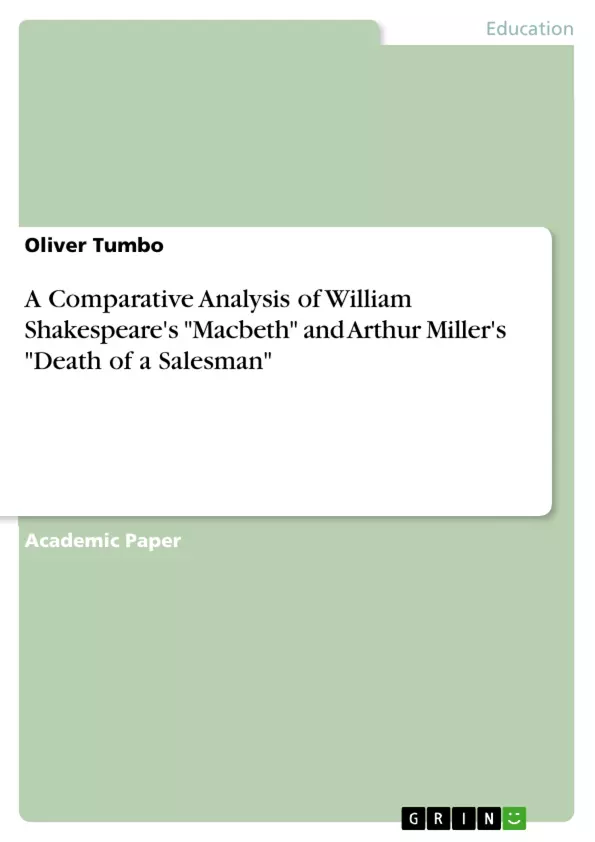In the realm of literature, the societal ethos of a specific era is reflected by playwrights through the skillful crafting of their works. This paper undertakes a comparative analysis of two timeless masterpieces: "Macbeth" by William Shakespeare and "Death of a Salesman" by Arthur Miller. Distinct styles, themes, dramatic irony, and soliloquy are wielded by these literary icons to impart a unique impact, captivating audiences and readers alike. The aim of this exploration is to unravel the nuances in how each literary work is woven, presenting a narrative that resonates with its audience.
Playwrights, as architects of societal reflection, have their works meticulously crafted, utilizing diverse literary elements to convey unique perspectives. In the comparison of "Macbeth" by William Shakespeare and "Death of a Salesman" by Arthur Miller, a journey is undertaken through themes, dramatic irony, and soliloquy to unravel the layers that distinguish these literary gems. Shakespeare and Miller, though belonging to different eras, leave an indelible mark on the landscape of dramatic storytelling. This exploration seeks to illuminate the thematic intricacies and narrative devices employed by these literary maestros, shedding light on the distinctiveness of their craft. The realms of ambition, betrayal, and the American dream are delved into, traversing the landscapes of both tragedy and modern disillusionment, witnessing the enduring power of literature to reflect the human condition.
Table of Contents
- Introduction
- Themes
- Themes in Macbeth
- Ambition
- Supernatural Equivocation
- Betrayal and Treachery
- Crime
- Good versus Evil
- Statecraft
- Themes in Death of a Salesman
- The American Dream
- Abandonment
- Betrayal
- Themes in Macbeth
- Dramatic Irony
- Dramatic Irony in Macbeth
- Dramatic Irony in Death of a Salesman
- Soliloquy
Objectives and Key Themes
The primary objective of this comparative analysis is to highlight the similarities and differences in how William Shakespeare's Macbeth and Arthur Miller's Death of a Salesman utilize various literary elements, including themes, dramatic irony, and soliloquy. This analysis aims to demonstrate how these techniques contribute to the effectiveness of both plays and their capacity to engage the audience.
- The impact of ambition and its consequences
- The nature of betrayal and its consequences on individuals and society
- The exploration of the American Dream and its societal implications
- The role of supernatural forces in shaping human destiny
- The clash between good and evil, both within characters and within society
Chapter Summaries
- Introduction: This section provides a brief overview of the purpose of the comparative analysis, introducing the playwrights and their works. It highlights the key literary elements that will be examined in the subsequent sections.
- Themes: This chapter explores the key thematic elements of both Macbeth and Death of a Salesman. For Macbeth, it delves into themes of ambition, supernatural forces, betrayal, crime, and statecraft, drawing examples from the play to illustrate each theme. Similarly, the analysis of Death of a Salesman examines the themes of the American Dream, abandonment, and betrayal, connecting these themes to the characters and their actions.
- Dramatic Irony: This chapter focuses on the use of dramatic irony in both plays, analyzing how it creates tension and enhances the audience's understanding of the characters' motivations and actions. It discusses specific instances of dramatic irony from both Macbeth and Death of a Salesman, providing examples of the contrast between characters' knowledge and the audience's knowledge.
- Soliloquy: This chapter explores the use of soliloquies in the two plays. It examines how soliloquies reveal characters' inner thoughts and feelings, providing insights into their motivations and desires.
Keywords
This comparative analysis focuses on the themes, dramatic irony, and soliloquy in Shakespeare's Macbeth and Miller's Death of a Salesman. It delves into key themes like ambition, betrayal, the American Dream, and supernatural forces. The analysis explores how these literary elements contribute to the dramatic impact and thematic depth of both plays.
Frequently Asked Questions
What are the main themes in Shakespeare's Macbeth?
The key themes include ambition, supernatural equivocation, betrayal, treachery, and the struggle between good and evil.
How is the American Dream portrayed in Death of a Salesman?
Arthur Miller explores the American Dream as a source of disillusionment and tragedy for the protagonist, Willy Loman, highlighting themes of abandonment and betrayal.
What is the role of dramatic irony in these plays?
Dramatic irony is used to create tension by allowing the audience to know things that the characters do not, enhancing the impact of their tragic downfalls.
Why are soliloquies important in Macbeth?
Soliloquies reveal Macbeth's inner thoughts, his growing guilt, and his moral decay, giving the audience deep insight into his psychological state.
What is the common thread between the two tragedies?
Both plays examine the human condition through the lens of individual ambition and the devastating consequences of betrayal on both a personal and societal level.
- Citar trabajo
- Oliver Tumbo (Autor), 2020, A Comparative Analysis of William Shakespeare's "Macbeth" and Arthur Miller's "Death of a Salesman", Múnich, GRIN Verlag, https://www.grin.com/document/966948



